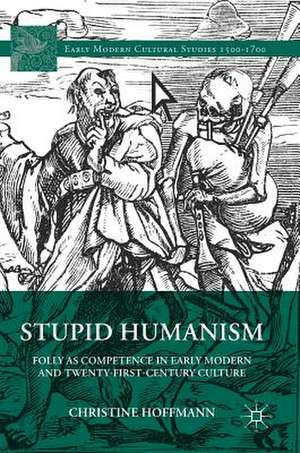Stupid Humanism: Folly as Competence in Early Modern and Twenty-First-Century Culture: Early Modern Cultural Studies 1500–1700
Autor Christine Hoffmannen Limba Engleză Hardback – 20 noi 2017
| Toate formatele și edițiile | Preț | Express |
|---|---|---|
| Paperback (1) | 578.05 lei 6-8 săpt. | |
| Springer International Publishing – 24 mai 2018 | 578.05 lei 6-8 săpt. | |
| Hardback (1) | 583.28 lei 6-8 săpt. | |
| Springer International Publishing – 20 noi 2017 | 583.28 lei 6-8 săpt. |
Din seria Early Modern Cultural Studies 1500–1700
-
 Preț: 280.32 lei
Preț: 280.32 lei - 15%
 Preț: 640.06 lei
Preț: 640.06 lei -
 Preț: 388.34 lei
Preț: 388.34 lei -
 Preț: 389.70 lei
Preț: 389.70 lei -
 Preț: 388.13 lei
Preț: 388.13 lei - 15%
 Preț: 639.25 lei
Preț: 639.25 lei -
 Preț: 388.72 lei
Preț: 388.72 lei -
 Preț: 386.81 lei
Preț: 386.81 lei - 18%
 Preț: 727.48 lei
Preț: 727.48 lei - 15%
 Preț: 582.30 lei
Preț: 582.30 lei -
 Preț: 388.90 lei
Preț: 388.90 lei -
 Preț: 389.70 lei
Preț: 389.70 lei -
 Preț: 393.90 lei
Preț: 393.90 lei -
 Preț: 383.93 lei
Preț: 383.93 lei -
 Preț: 390.63 lei
Preț: 390.63 lei -
 Preț: 384.48 lei
Preț: 384.48 lei -
 Preț: 389.70 lei
Preț: 389.70 lei - 15%
 Preț: 641.71 lei
Preț: 641.71 lei -
 Preț: 390.25 lei
Preț: 390.25 lei -
 Preț: 234.11 lei
Preț: 234.11 lei -
 Preț: 386.99 lei
Preț: 386.99 lei -
 Preț: 389.31 lei
Preț: 389.31 lei -
 Preț: 388.13 lei
Preț: 388.13 lei -
 Preț: 385.84 lei
Preț: 385.84 lei -
 Preț: 385.84 lei
Preț: 385.84 lei -
 Preț: 383.12 lei
Preț: 383.12 lei - 18%
 Preț: 732.70 lei
Preț: 732.70 lei -
 Preț: 391.61 lei
Preț: 391.61 lei - 15%
 Preț: 697.15 lei
Preț: 697.15 lei -
 Preț: 386.81 lei
Preț: 386.81 lei - 15%
 Preț: 702.24 lei
Preț: 702.24 lei -
 Preț: 390.25 lei
Preț: 390.25 lei -
 Preț: 388.90 lei
Preț: 388.90 lei
Preț: 583.28 lei
Preț vechi: 686.21 lei
-15% Nou
Puncte Express: 875
Preț estimativ în valută:
111.63€ • 116.11$ • 92.15£
111.63€ • 116.11$ • 92.15£
Carte tipărită la comandă
Livrare economică 15-29 aprilie
Preluare comenzi: 021 569.72.76
Specificații
ISBN-13: 9783319637501
ISBN-10: 3319637509
Pagini: 192
Ilustrații: XIV, 192 p. 31 illus.
Dimensiuni: 148 x 210 mm
Greutate: 0.4 kg
Ediția:1st ed. 2017
Editura: Springer International Publishing
Colecția Palgrave Macmillan
Seria Early Modern Cultural Studies 1500–1700
Locul publicării:Cham, Switzerland
ISBN-10: 3319637509
Pagini: 192
Ilustrații: XIV, 192 p. 31 illus.
Dimensiuni: 148 x 210 mm
Greutate: 0.4 kg
Ediția:1st ed. 2017
Editura: Springer International Publishing
Colecția Palgrave Macmillan
Seria Early Modern Cultural Studies 1500–1700
Locul publicării:Cham, Switzerland
Cuprins
1 Introduction: Spamming the Renaissance.- 2 Middling Through Somehow: Queer Temporality and the Disaster Meme.- 3 Folly 2020! The Campaign for Foolishness in 21st-Century Politics.- 4 The Anatomy of Public Shaming.- 5 What is Clickbait? (Check All That Apply).- 6 The Faerie Queene, the Gif and the Rhetorical Stuplime.
Notă biografică
Christine Hoffmann is Assistant professor in the English Department at West Virginia University. She writes and teaches about early modern English literature; the rhetoric and ethics of social media; and the posthuman intercessions within copia and collecting. If you are a collector of weird stuff, contact her at cehoffmann@mail.wvu.edu.
Textul de pe ultima copertă
This book frames the undeniably copious 21st-century performances of stupidity that occur within social media as echoes of rhetorical experiments conducted by humanist writers of the Renaissance. Any historical overview of humanism will associate it with copia—abundance of expression—and the rhetorical practices essential to managing it. This book argues that stupidity was and is a synonym for copia, making the humanism of which copia is a central element an inherently stupid philosophy. A transhistorical exploration of stupidity demonstrates that not only is excess still the surest way to eloquence, but it is also just the kind of spammy, speculative undertaking to generate a more generous and inventive comprehension of human and nonhuman relationships. In chapters exploring the rhetorics of memes, attack ads, public shaming blogs, clickbait and gifs, Stupid Humanism outlines the possibilities for a humanism less invested in the normative logics that enshrine knowledge, eloquence and linear development as the chief indicators of an active, articulated selfhood and more supportive of a program for queer knowledge, trivial pursuits, anti-social ethics and the curious relationships that form around and in response to abundance of expression.
Caracteristici
Re-conceives how scholars and thinkers should approach traditional notions of Humanism Explores a wide range of source material from both the Early Modern period and contemporary culture, including Shakespeare, memes, YouTube videos, Spenser, and more Offers useful discussion and thought for scholars within rhetoric and composition, new media, and cultural studies, particularly those interested in posthumanism, queer studies and/or object-oriented ontology Includes supplementary material: sn.pub/extras
